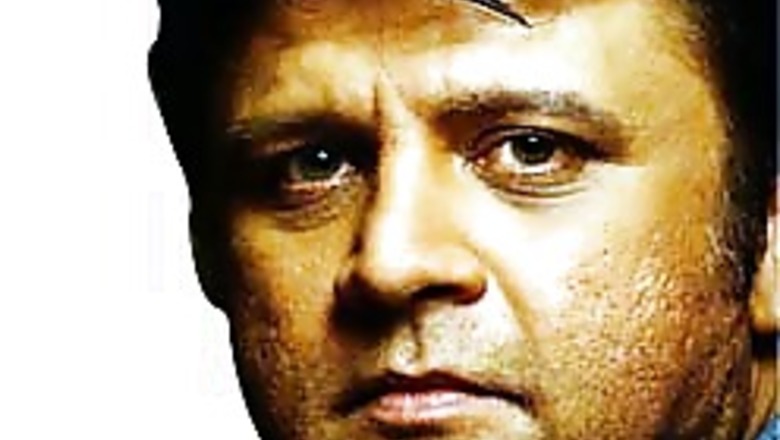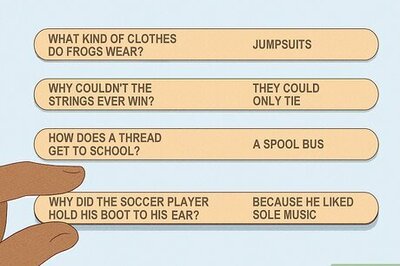
views
Controversy, court cases, allegations of favouritism, recognising non-original body of work - the National Film Awards, in the recent past, have been in the news for all the wrong reasons.
Have the Awards, supposed to fete the best in the sphere of Indian cinema, lost their relevance?
Have the Awards failed to recognise regional cinema, and are instead promoting Bollywood?
IBNLive.com organised a chat with Parzania director Rahul Dholakia, who is also a member of the National Film Awards jury. Reproduced below is the transcript of the chat.
Rajv_2k: Why are National Awards in recent times going to Bollywood, ignoring great works in non-Hindi languages? Can you explain how Madhur Bhandarkar's direction for Traffic Signal was better than Priyanandanan's for Pulijanmam or Ameer's for Paruthiveeran?
Rahul Dholakia: You should have seen the entries to ask me- and Bollywood has only got 25 per cent of the awards- 75 per cent has gone to regional cinema. Pulijanman got the best film and Ameer's work as a director did not make it because the majority of the jury preferred Traffic…. You have to understand that the jury comes from all over India, and I believe violence in Paruthiveeran may have put them off. They preferred a social- more national theme- in fact, they felt that if violence is Tamil style of cinema, it was better justified in Veyl, and so that won the best film. Personally I thought Pashupati (Veyl), Priyamani and Tilakan were all brilliant in their roles.
Avvantika: Lately, we've seen the Indian audience grow as a viewer. As a director, do you think this is only a phase or will we be able to grow further and accept serious movies like Parzania?
Rahul Dholakia: I hope they do, but I think this is not a phase. I am trying to bridge that gap of serious and commercial through Lamha- let’s hope it works. The youth are going to decide the future of cinema, and I hope they like experimental stuff
Arr4music: Why was Guru not selected for any awards? I, at least, expected something for the music section. Rahman's background score was world class, and appreciated even by the foreign media.
Rahul Dholakia: The Konkani film Antarnad had great music. ‘Guru’ did not make it to the final round.
Samrat: You have worked in the US and now in India. What is the difference in terms of professional approach, skill-set, expertise? Also, do you think Brand Bollywood is as big as it is made out to be overseas? Or is it all a media myth?
Rahul Dholakia: Brand Bollywood is like an "item number" in an international film festival. In comparison, our cinema is pathetic (I just saw 105 films- from all over- and I am not surprised why we don’t get anywhere).
U Tell: Are actors / technicians part of the jury in order to understand the nuances of the various dept of a film?
Rahul Dholakia: This is one big problem we faced this year. Thank God some of us were technically sound- but I have requested the Chairman to put in a strong recommendation to the Government to include actors/cameraman/art directors etc. But what happens is that no one wants to give time. A technician makes a minimum of 10,000 rupees a day. So if he is a member of the jury, he would have to sacrifice 3 weeks pay at least. We get Rs 500 rupees sitting fee and Rs 150 dinner allowance! Who is going to be a member of the jury then?
Amrita: Do you think India is better off in terms of creative license, artistic freedom? Or do you think that filmmakers here don't enjoy it when compared to the US?
Rahul Dholakia: I think there is very little creative license here. Stars still rule here and unlike the west, Indie cinema or alternative cinema is almost extinct. So if you want to experiment, you can’t do much because most of the times you don’t have the budget -- once you get that (1 in 100) then you can’t get stars, because they don’t want to experiment. So you have to work with actors (which is great) but distribution becomes a problem. Regarding choice of subject, we have so many god damn rules – can’t show this and can’t show that -- you will offend this community and that one will protest. That is frustrating for a filmmaker. So I think the greatest joy in India is not winning awards or getting super hits, but if a filmmaker can tell a story he believes in- without corrupting his soul.
PAGE_BREAK
Avvantika: Could you tell us more about Naya Andaz? Your greatest contribution to the Indian community in America?
Rahul Dholakia: Log on to naya-andaz.net or nayaandaz.net I think.. I am taking a backseat on it now as I am working here
Mende: Everything comes at a cost, what has fame cost you?
Rahul Dholakia: My health! My friends and a lot of misunderstanding from some family members and, of course, a lot of debt in India and America.
Mende: Do you read books? Which one are you reading at the moment?
Rahul Dholakia: I have been watching 6 films a day for the last 20 days (awards) - no time for anything else. And all my reading is focussed on Kashmir at present because of my film.
Mohit: Can the process of films selection be made more transparent? After all, Raveena Tandon got the award for Daman when her actor uncle MacMohan was on the panel. Comments?
Rahul Dholakia: Anything about government is hard to be transparent. What would be good would be if the jury selected was without any agenda. We were made to sign declarations (thanks to the case you mentioned).
Deepa: The Arushi murder case has become a question of great interest to the nation. So would you like to make a movie on her?
Rahul Dholakia: I am preoccupied with Lamha and another untitled film. After that god knows!
U Tell: Just wanted to know how the awards work cause if Saif's performance in Omkara is not recognised then it does raise the question as to what is needed to be noticed by the jury? Not that it makes any difference as his performance is one of the best I have seen in recent times. Would you agree?
Rahul Dholakia: I agree Saif was brilliant in Omkara and I was the one who proposed his name. Unfortunately I was outnumbered and they chose Dilip Prabhavalkar in Lage Raho… and Shevri (Marathi). Not to take it away from him, because Dilip was good, but I still think Saif deserved it because he is the soul of Omkara.
Mende: Wouldn’t you ever direct a mainstream movie?
Rahul Dholakia: Lamha has Sanjay Dutt and will be a thriller set in Kashmir.
Amrita: How does it feel to be a member of the panel? Did you face any bureaucratic pressures? Red-tape? Or any interference? Please be candid.
Rahul Dholakia: No pressures from any source- thank god! But I did notice that some members were under pressure from their own states as they are answerable to their respective governments. So there is some kind of internal lobbying if one may say -- but no one approached me directly. Thank God for that.
Sudhesh: Do you think anybody gives a damn about National Film Awards any more?
Rahul Dholakia: I do, that’s why I went. You have to understand that a lot of regional cinema depends on National Awards. Four of the Malayalam films which won, will probably see a release after two years. Now that’s a great relief to a filmmaker isn’t it?
Hema: Your next movie Lamha is on Kashmir. Would you show the plight of the Hindus? Would you show how 250,000 Hindus were driven out of the Valley? Would you show how thousands were butchered by the militants and how the so-called secular Congress kept quiet? By the way, I am a Kashmiri Hindu.
Rahul Dholakia: We can chat later- write to me at [email protected], my co screenwriter is also a Pandit and so is my dialogue writer.
Sheikh: Did u ever try to release Parzania in Gujarat? Where there issues faced by you? And do you plan to release it in the near future?
Rahul Dholakia: Yes I did. They wanted right-wing leaders to see the film and approve of it. That was unacceptable by me as the Censor had already given it a clearance for an all-India release. People have seen it on cable (illegally) and on DVD, now have dubbed it in Hindi too.
PAGE_BREAK
Mende: What does Parzania mean to you?
Rahul Dholakia: It has changed my life. It means a lot more than a movie would mean to a director, normally.
Mohit: Why is it that anything in India gets mired in controversy? Is it to do with our inherent love for all things controversial? Or does it just happen?
Rahul Dholakia: My film was controversial because it was unofficially banned in Gujarat. And that because some people in power did not want to see the truth.
Faisal: Greetings to you...can I ask you what made you make a film on the Gujarat riots since no other director/producer has ever attempted or has had the courage to do it? Going ahead I wish you success in your career and in your life...All the Best!
Rahul Dholakia: It was more about what happens to a person when he is a victim of communal violence. It’s a true story of a friend of mine.
Hema: Do you have the guts do a movie on Imrana who was raped by her own father-in-law and was subjected to Islamic injustice? Do you have the guts to challenge the Muslims?
Rahul Dholakia: Hi Hema: It’s not about guts but about what story a filmmaker wants to tell. My next film is on Kashmir called Lamha. Watch out for it.
Gaurav Verma: Why are the National Awards announced after so much delay? You are awarding movies released in 2006 in mid-2008. That’s more than a year’s delay. Also, how is the National Awards jury planning to cope up with all the negative publicity it has generated?
Rahul Dholakia: The 2005 awards (films that are censored in 2005) were delayed due to court cases. So we had 2006 in 2008! Now in 6 months, they plan to do 2007 and subsequently 2008 awards.
Suhas: I am a film student and I understand that a film is a complex structure, an art I would say. Sir, I wanted to know how do you judge a film? Do we in India get carried away by just the emotional or the rhetoric appeal of a film or do we consider other elements of that complex structure such as the film style? I would be glad if you would shed some light on this.
Rahul Dholakia: This year we went for content rather than names and techniques as we had to judge between films that are made of budgets of Rs 20 lakhs and films that have budgets over Rs 20 crores.
Sunil Kumar: Don't you think directors deliberately make sensitive movies like Parzania to 'earn' National Awards? Will a director like you also try to make a movie on Shah Bano?
Rahul Dholakia: I did not make Parzania for a National Award. Forget that, I wasn’t even sure the film would have been censored and released in India.
Nasir: How can anyone get a National Award for being the best director (Bhandarkar) for a commercially flop movie (Traffic Signal)?
Rahul Dholakia: To answer your question briefly, Madhur was chosen by a majority of jury members who really liked Traffic Signal. They thought it was a great concept and handled his craft well. They had also seen ‘Corporate’ (also an entry) and thought the director could do justice to a diverse subject in Traffic Signal.
















Comments
0 comment